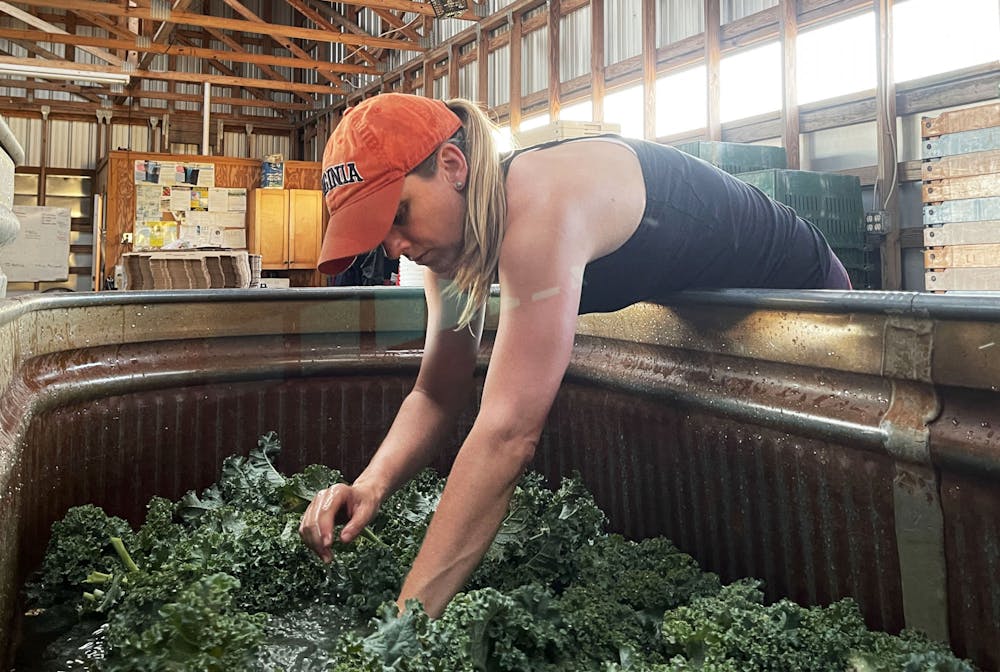Known as the “veggie girl,” Tuesday Gilliam harvests vegetables at local farms each week to distribute excess food to East Gainesville residents.
Gilliam, 40, organized an event at Siembra Farm in East Gainesville on May 4 to harvest the crops the farm did not use. The event began at 6 p.m. and volunteers stayed until 8:30 p.m. to pick and wash vegetables and create 110 community-supported agriculture boxes.
During the harvest, volunteers split up among rows of crops to pick hundreds of vegetables including carrots, potatoes, kale, collards and mustard greens. The volunteers bundled their crops together with rubber bands for packing and distribution, and they could even take an unboxed pile home before they left.
Gilliam said this initiative is incredibly important because East Gainesville is classified as a food desert with limited access to nutritious, affordable food. She said not enough people know about the extreme number of extra vegetables at the four farms in the middle of the area.
These white-owned farms are in a predominantly Black neighborhood, which Gilliam said is subject to gentrification. As a white ally, her desire to give back to the community inspired this mutual aid effort.
Dina Liebowitz, the UF Field and Fork program coordinator, has helped at the farm for the past two years.
“It is just the most meaningful thing I can fathom, especially working on a sustainable farm like this,” she said. “They care about all the things that I care about.”
The project, which involves Siembra Farm, Family Garden, Nicoya Farm and Hawthorne Organic Farm, helps reduce food waste, feed the community and foster an environmentally sustainable process through food activism.
Linda Williams, a 62-year-old retired surgical technician at Shands Hospital and a member of the GRACE Grows community advisory board, has lived by the farms for 15 years and received food for more than a year.
“It’s impacted me to help with the shortage of fresh vegetables,” she said. “I have 17 grandkids, and every other day I cook not only for my grandkids but for the homeless people too and take food out in trays and her [Gilliam] bringing these vegetables and stuff helps me out so much.”
Gilliam said she worked with her best friend, Karen Smith, to organize their passion project. Like Gilliam, Smith was an avid activist who cared about giving back to her community, but Smith died in a car accident in November. Gilliam had to continue without her.
“I fell apart completely,” she said. “I didn’t even want to look at vegetables, so it’s kind of weird to think of tonight. Out of the blue, people just started coming. It’s coming full circle. All of this is dedicated to Karen Smith.”
The project has been hard for Gilliam, but she said the support of those around her helped continue her goal of providing reparations to the East Gainesville community to combat ongoing gentrification. She said she hopes her efforts on the farm will achieve the opposite of environmental racism, which involves the environmental hazards that disproportionately affect people of color.
Carmen Rosa, a 44-year-old vocational rehabilitation counselor, volunteered at the farm for the first time on May 4.
“I’m in a position where I don’t need anything, and I have been in the position where I do,” she said. “Now that I feel better in life, I feel like I have to help others that are not in the same position as me, as a way to be grateful for how lucky I’ve been.”
Through her volunteer work, Rosa found a community she said is often hard to come by. She said she recently moved to the United States from Puerto Rico and was surprised to see the individualistic presence throughout the U.S.
“The sense of community isn’t as strong here in the states versus where I come from, so to see that there are people that are trying to help others and build that community that helps each other, that’s really nice to see,” she said.
Gilliam said she has high hopes for the project, and she plans to continue harvesting the excess food every Tuesday until the end of the season in June.
However, she is struggling to find affordable housing since apartments are targeted towards students. She acknowledges her privilege as a white person and does not want to buy a house in the area because she says it would further the gentrification she is fighting against. She has been living in a cabin by the farm for two years as a single mother, and she said she wants to move to a nicer place to raise her 13-year-old child.
She is nervous about the future of the project if she moves out of the area, but she said she has found a support system that she hopes will continue leading the weekly harvesting project, especially because of how much the project means to her.
“We all need it, whether you are a Republican, or a Democrat, or an Anarchist, whether you’re Black or white or whatever, we really all need food,” she said. “In a way, it’s some of the best activism I’ve been involved in in my life.”
Contact Joelle Wittig at jwittig@alligator.org. Follow him on Twitter @JoelleWittig.






